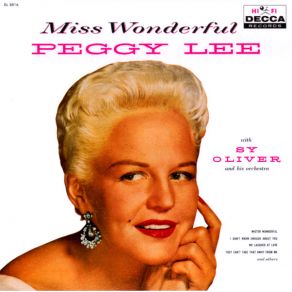Miss Wonderful
Download links and information about Miss Wonderful by Peggy Lee. This album was released in 1959 and it belongs to Jazz, Vocal Jazz, Pop genres. It contains 12 tracks with total duration of 34:51 minutes.

|
|
|---|---|
| Artist: | Peggy Lee |
| Release date: | 1959 |
| Genre: | Jazz, Vocal Jazz, Pop |
| Tracks: | 12 |
| Duration: | 34:51 |
| Buy it NOW at: | |
| Buy on iTunes $4.99 | |
| Buy on Amazon $24.99 | |
| Buy on Songswave €0.98 | |
| Buy on Songswave €1.00 | |
Tracks
[Edit]| No. | Title | Length |
|---|---|---|
| 1. | Mr. Wonderful (Single Version) (featuring Sy Oliver, Sy Oliver And His Orchestra) | 3:17 |
| 2. | They Can't Take That Away from Me (Single Version) (featuring Sy Oliver, Sy Oliver And His Orchestra) | 2:56 |
| 3. | Where Flamingos Fly (Single Version) | 2:26 |
| 4. | You've Got to See Mamma Every Night (Or You Can't See Mamma At All) [Single Version] | 2:44 |
| 5. | The Comeback | 3:00 |
| 6. | Take a Little Time to Smile | 2:35 |
| 7. | I Don't Know Enough About You (Single Version) (featuring Sy Oliver, Sy Oliver And His Orchestra) | 2:56 |
| 8. | Joey, Joey, Joey (Single Version) (featuring Sy Oliver, Sy Oliver And His Orchestra) | 2:43 |
| 9. | Crazy In the Heart (Single Version) (featuring Sy Oliver, Sy Oliver And His Orchestra) | 2:53 |
| 10. | You Oughta Be Mine | 3:04 |
| 11. | We Laughed At Love | 3:12 |
| 12. | That's Alright Honey | 3:05 |
Details
[Edit]Recorded in 1956, Peggy Lee’s Miss Wonderful pairs explicitly blues-based material with bouncy orchestral arrangements. “You’ve Got to See Mamma Ev’ry Night (Or You Can’t See Mamma at All),” “The Comeback,” and “That’s Alright Honey” are enjoyable despite their theatrical approach to blues. While this was a good fit for some of the era's brassier female singers, Lee was a master of the blues in its most subtle form. Her ability to personalize a song's mood and overlay it with multiple, often opposing emotional dispositions was the signature of her craft. That her rendition of Frank Loesser’s “Joey, Joey, Joey” has more authentic blues than “You’ve Got To See Mamma Ev’ry Night” tells you everything you need to know about Lee’s style. Arranger Sy Oliver underscores several of the performances with a subtle flavoring of conga, which is one of the little touches that distinguish a Peggy Lee set. The centerpiece is “Where Flamingos Fly,” a forceful showstopper that Lee delivers as an outlaw’s tale of lust.